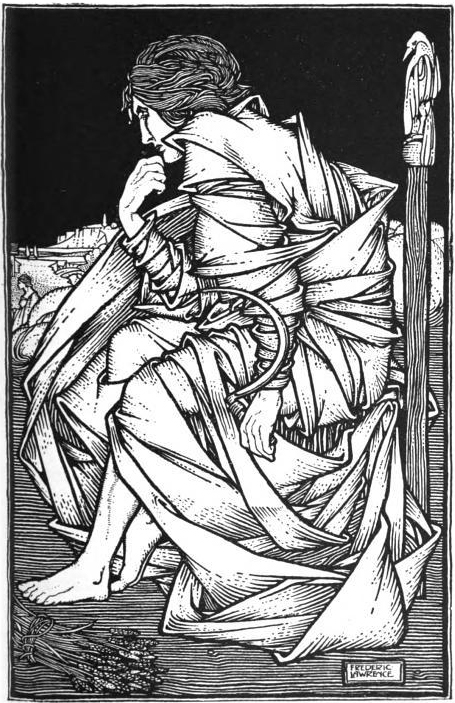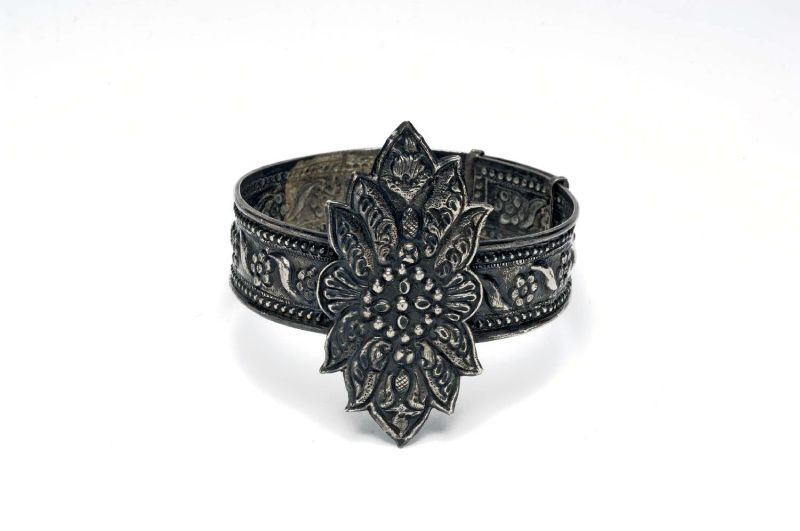|
Ívaldi
In Norse mythology, the Sons of Ivaldi are a group of dwarfs who fashion Skíðblaðnir, the flying ship of Freyr, Gungnir, the spear belonging to Odin, along with the golden hair for Sif to replace what Loki had cut off. According to ''Skáldskaparmál'', after these objects were created Loki made a bet with a dwarf, Brokkr, that his brother Eitri (or Sindri) would not be able to craft items to match the quality of those displayed by the sons of Ivaldi. This contest resulted in the creation of the boar of Freyr (Gullinbursti), the ring of Odin (Draupnir) and the hammer of Thor ( Mjolnir), which were judged by the gods to be even more wondrous than the others. Thus, Brokkr had won the bet. The account of this tale given in ''Skáldskaparmál'' does not reveal the names of Ivaldi's sons, nor how many there were, and they remain conspicuously absent after their initial mention in the stanza. The passing mention made of them in ''Grímnismál'' 43, the creators of Skidbladni ... [...More Info...] [...Related Items...] OR: [Wikipedia] [Google] [Baidu] |
Dwarf (Germanic Mythology)
A dwarf () is a type of supernatural being in Germanic folklore, including mythology. Accounts of dwarfs vary significantly throughout history however they are commonly, but not exclusively, presented as living in mountains or stones and being skilled craftsmen. In early literary sources, only males are explicitly referred to as dwarfs, although they are described as having sisters and daughters, while both male and female dwarfs feature in later saga literature and folklore. Dwarfs are sometimes described as short, however, scholars have noted that this is neither explicit nor of relevance to their roles in the earliest sources. Dwarfs continue to feature in modern popular culture such as in the works of J.R.R. Tolkien and Terry Pratchett, where they are often, but not exclusively, presented as distinct from elves. Etymology The modern English noun ''dwarf'' descends from ang, dweorg. It has a variety of cognates in other Germanic languages, including non, dvergr and goh, ... [...More Info...] [...Related Items...] OR: [Wikipedia] [Google] [Baidu] |
Freyr
Freyr (Old Norse: 'Lord'), sometimes anglicized as Frey, is a widely attested god in Norse mythology, associated with kingship, fertility, peace, and weather. Freyr, sometimes referred to as Yngvi-Freyr, was especially associated with Sweden and seen as an ancestor of the Swedish royal house. According to Adam of Bremen, Freyr was associated with peace and pleasure, and was represented with a phallic statue in the Temple at Uppsala. According to Snorri Sturluson, Freyr was "the most renowned of the æsir", and was venerated for good harvest and peace. In the mythological stories in the Icelandic books the ''Poetic Edda'' and the ''Prose Edda'', Freyr is presented as one of the Vanir, the son of the god Njörðr and his sister-wife, as well as the twin brother of the goddess Freyja. The gods gave him Álfheimr, the realm of the Elves, as a teething present. He rides the shining dwarf-made boar Gullinbursti and possesses the ship Skíðblaðnir which always has a favorable ... [...More Info...] [...Related Items...] OR: [Wikipedia] [Google] [Baidu] |
The Third Gift — An Enormous Hammer By Elmer Boyd Smith
''The'' () is a grammatical article in English, denoting persons or things already mentioned, under discussion, implied or otherwise presumed familiar to listeners, readers, or speakers. It is the definite article in English. ''The'' is the most frequently used word in the English language; studies and analyses of texts have found it to account for seven percent of all printed English-language words. It is derived from gendered articles in Old English which combined in Middle English and now has a single form used with pronouns of any gender. The word can be used with both singular and plural nouns, and with a noun that starts with any letter. This is different from many other languages, which have different forms of the definite article for different genders or numbers. Pronunciation In most dialects, "the" is pronounced as (with the voiced dental fricative followed by a schwa) when followed by a consonant sound, and as (homophone of pronoun ''thee'') when followed by a ... [...More Info...] [...Related Items...] OR: [Wikipedia] [Google] [Baidu] |
Arm Ring
An arm ring, also known as an armlet or an armband, is a band of metal, usually a precious metal, worn as jewelry or an ornament around the biceps of the upper arm. The arm ring is similar to a bracelet or bangle, though it must be shaped and sized to fit snugly to the upper arm. Historically, the arm ring was commonly worn by men, and often a " ''ring''" in Bronze-Age heroic literature would refer to an arm ring, rather than a finger ring. Modern-day arm rings are generally fashion accessories worn by women. In Indonesia, an arm ring is called ''kelat bahu''; it is commonly used by both men and women as traditional jewelry in Javanese, Sundanese, and Balinese traditional costumes, worn usually in wedding ceremony or in traditional dance. The decorative arm rings are usually made of metals such as gold, silver, or brass, and can trace their history from the Indonesian Hindu-Buddhist past of ancient Java. Sri Lankan history notes that brides wore armlets to ward off ill ... [...More Info...] [...Related Items...] OR: [Wikipedia] [Google] [Baidu] |
Gangr
Gangr (or Gang; Old Norse: , 'traveller') is a jötunn in Norse mythology. He is portrayed as the son of Alvaldi and the brother of Þjazi and Iði. Name The Old Norse name ''Gangr'' has been translated as 'traveller'. It is related to the Icelandic ''gangur'' and the Norwegian ''gang'' ('walking, hallway, corridor'), all stemming from Proto-Germanic ''*gangaz'' ('walking, going, way'; compare with Gothic ''gagg'' 'street, road', and with Old English and Old High German ''gang'' 'going, journey, way'). Attestation In '' Skáldskaparmál'' (Language of Poetry)'','' Gangr is mentioned as the son of the jötunn Alvaldi, who is "very rich in gold", and as the brother of Þjazi and Iði Iði (Old Norse: ; also Idi) is a jötunn in Norse mythology. He is the son of Alvaldi and the brother of Þjazi and Gangr. Name The Old Norse name ''Iði'' has been translated as the 'active one' or the 'hard-working one', deriving from ''i� .... References Bibliography * * * * ... [...More Info...] [...Related Items...] OR: [Wikipedia] [Google] [Baidu] |
Iði
Iði (Old Norse: ; also Idi) is a jötunn in Norse mythology. He is the son of Alvaldi and the brother of Þjazi and Gangr. Name The Old Norse name ''Iði'' has been translated as the 'active one' or the 'hard-working one', deriving from ''ið'' ('work'; compare with Norwegian ''idig'' and Swedish ''idog'' 'hard-working'). Attestations In '' Skáldskaparmál'' (Language of Poetry)'','' Iði is mentioned as the son of the jötunn Alvaldi, who is "very rich in gold", and as the brother of Þjazi In Norse mythology, Þjazi (Old Norse: ; anglicized as Thiazi, Thjazi, Tjasse or Thiassi) was a giant. He was a son of the giant Ölvaldi, brother of giants Iði and Gangr, and the father of Skaði. His most notable misdeed was the kidnapp ... and Gangr: References Bibliography * * * Jötnar {{Norse-myth-stub ... [...More Info...] [...Related Items...] OR: [Wikipedia] [Google] [Baidu] |
Alvaldi
Alvaldi (also Ölvaldi; Old Norse 'all-powerful') is a jötunn in Norse mythology, presented as the father of Þjazi. Saturn's moon Alvaldi is named after him. Name The Old Norse name ''Alvadi'' means 'all-powerful'. The name ''Ölvadi'', found in '' Skáldskaparmál'', appears to be a variant form referring to the same character. Attestations In '' Hárbarðsljóð'' (Lay of Hárbarðr), Alvadi is mentioned as the father of the jötunn Þjazi. In '' Skáldskaparmál'' (Language of Poetry)'','' he is named Ölvadi and portrayed as the father of Þjazi, Gangr and Iði Iði (Old Norse: ; also Idi) is a jötunn in Norse mythology. He is the son of Alvaldi and the brother of Þjazi and Gangr. Name The Old Norse name ''Iði'' has been translated as the 'active one' or the 'hard-working one', deriving from ''i� .... Described as "very rich in gold", Ölvadi divides the inheritance among his sons in such a way that each may take the same mouthful of gold. According to phi ... [...More Info...] [...Related Items...] OR: [Wikipedia] [Google] [Baidu] |
Þjazi
In Norse mythology, Þjazi (Old Norse: ; anglicized as Thiazi, Thjazi, Tjasse or Thiassi) was a giant. He was a son of the giant Ölvaldi, brother of giants Iði and Gangr, and the father of Skaði. His most notable misdeed was the kidnapping of the goddess Iðunn, which is related in both the ''Prose Edda'' and the skaldic poem '' Haustlöng''. ''Skáldskaparmál'' According to '' Skáldskaparmál'', the gods Odin, Loki and Hœnir set out one day on a journey, traveling through mountains and wilderness until they were in need of food. In a valley they saw a herd of oxen, and they took one of the oxen and set it in an earth oven, but after a while they found that it would not cook. As they were trying to determine the reason for this, they heard someone talking in the oak tree above them, saying that he himself was the one responsible for the oven not cooking. They looked up and saw that it was Þjazi in the form of a great eagle, and he told them that if they would l ... [...More Info...] [...Related Items...] OR: [Wikipedia] [Google] [Baidu] |
Grímnismál
''Grímnismál'' (Old Norse: ; 'The Lay of Grímnir') is one of the mythological poems of the ''Poetic Edda''. It is preserved in the Codex Regius manuscript and the AM 748 I 4to fragment. It is spoken through the voice of ''Grímnir'', one of the many guises of the god Odin. The very name suggests guise, or mask or hood. Through an error, King Geirröth tortured Odin-as-Grímnir, a fatal mistake, since Odin caused him to fall upon his own sword. The poem is written mostly in the ljóðaháttr metre, typical for wisdom verse. Structure and history The work starts out with a lengthy prose section describing the circumstances leading up to Grímnir's monologue. The monologue itself comprises 54 stanzas of poetic verse describing the worlds and Odin's many guises. The third and last part of the poem is also prose, a brief description of Geirröth's demise, his son's ascension, and Odin's disappearance. The prose sections were most likely not part of the original oral versions ... [...More Info...] [...Related Items...] OR: [Wikipedia] [Google] [Baidu] |
Æsir
The Æsir (Old Norse: ) are the gods of the principal pantheon in Norse religion. They include Odin, Frigg, Höðr, Thor, and Baldr. The second Norse pantheon is the Vanir. In Norse mythology, the two pantheons wage war against each other, resulting in a unified pantheon. Unlike the Old English word ''god'' (and the Old Norse word '), Æsir was never converted over to Christian use. Etymology ''Æsir'' is the plural of '' áss'', ''ǫ́ss'' "god". In genitival compounds, it takes the form ', e.g. in ' ("Thor of the Æsir"), besides ' found in : '' ás-brú'' "gods' bridge" (the rainbow), : ' "gods' enclosure", : ' "gods' kin", : ' "gods' leader", : ' "gods' might" (especially of Thor), : ' "divine wrath" etc. : ' "national god" (') is a title of Thor, as is : ' "almighty god", while it is Odin who is "the" '. There is also Old East Norse dialectal : *''ās-ækia'' (OWN: *''áss-ekja''), i.e. "god ride" (Thor riding in his wagon), resulting in the modern Swedish word : '' ... [...More Info...] [...Related Items...] OR: [Wikipedia] [Google] [Baidu] |
-ed-Nibelungen_Not-p091-sigfird&alberich-gezwerge.jpg)

.png)
